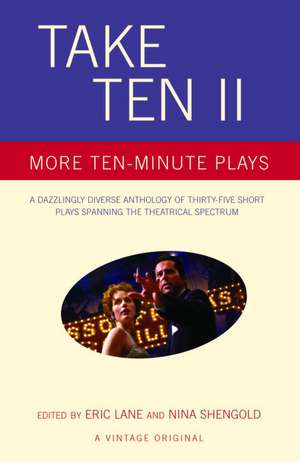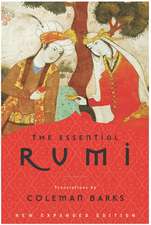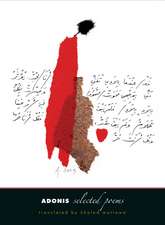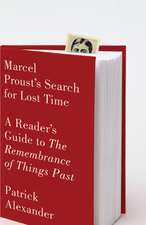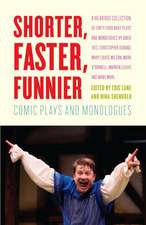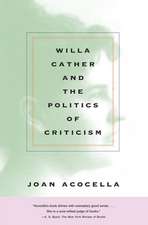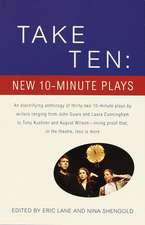Take Ten II: More Ten-Minute Plays
Editat de Eric Lane, Nina Shengolden Limba Engleză Paperback – 31 oct 2003
Actors, directors, producers and teachers will find Take Ten II an invaluable source of meaty roles for people of every age, ethnicity and gender; lovers of theatre will find it a richly satisfying read. These deceptively short plays throb with life in all its variety: harrowing, hilarious, and breathtakingly vital.
Preț: 125.77 lei
Nou
Puncte Express: 189
Preț estimativ în valută:
24.07€ • 24.99$ • 20.07£
24.07€ • 24.99$ • 20.07£
Carte disponibilă
Livrare economică 01-15 martie
Preluare comenzi: 021 569.72.76
Specificații
ISBN-13: 9781400032174
ISBN-10: 1400032172
Pagini: 417
Dimensiuni: 132 x 201 x 25 mm
Greutate: 0.32 kg
Editura: Vintage Books USA
ISBN-10: 1400032172
Pagini: 417
Dimensiuni: 132 x 201 x 25 mm
Greutate: 0.32 kg
Editura: Vintage Books USA
Notă biografică
Nina Shengold won the ABC Playwright Award and the LA Weekly Award for her play "Homesteaders." Her one-acts have been performed all over the country, and her TV scripts include Hallmark Hall of Fame's "Blind Spot," starring Joanne Woodward, and "Silent Night." A founding member of the theater company Actors & Writers, she lives in upstate New York.
Eric Lane is an award-winning playwright, filmmaker and book editor. Plays include: Times of War, Cater-Waiter and Dancing on Checkers’ Grave, which starred Jennifer Aniston. His new play Heart of the City has been optioned for off-Broadway. Eric has written and produced two short films: First Breath and Cater-Waiter, which he also directed. Honors include a Writer’s Guild Award, La MaMa Playwright Award, Berrilla Kerr Award and two-time O’Neill Center finalist. He has won fellowships at Yaddo and St. James Cavalier in Malta. Eric is Artistic Director of Orange Thoughts Productions, a not-for-profit theater & film company in New York City.
Shengold and Lane are the editors of Plays for Actresses and Take Ten: New Ten-Minute Plays, both in Vintage. For Penguin they edited Moving Parts: Monologues from Contemporary Plays, The Actor's Book of Scenes from New Plays, and The Actor's Book of Gay & Lesbian Plays, which was nominated for the Lambda Literary Award.
Eric Lane is an award-winning playwright, filmmaker and book editor. Plays include: Times of War, Cater-Waiter and Dancing on Checkers’ Grave, which starred Jennifer Aniston. His new play Heart of the City has been optioned for off-Broadway. Eric has written and produced two short films: First Breath and Cater-Waiter, which he also directed. Honors include a Writer’s Guild Award, La MaMa Playwright Award, Berrilla Kerr Award and two-time O’Neill Center finalist. He has won fellowships at Yaddo and St. James Cavalier in Malta. Eric is Artistic Director of Orange Thoughts Productions, a not-for-profit theater & film company in New York City.
Shengold and Lane are the editors of Plays for Actresses and Take Ten: New Ten-Minute Plays, both in Vintage. For Penguin they edited Moving Parts: Monologues from Contemporary Plays, The Actor's Book of Scenes from New Plays, and The Actor's Book of Gay & Lesbian Plays, which was nominated for the Lambda Literary Award.
Extras
ANTIGONE'S RED
Chiori Miyagawa
Characters
ANTIGONE: Japanese American woman in her early thirties.
ISMENE: Antigone's younger sister.
TADASHI: Japanese American man in his early thirties.
BRIAN: Caucasian man, Ismene's husband.
GUARD: Caucasian man.
TIME: 1942.
PLACE: Manzanar, California.
PROLOGUE
ANTIGONE: With my bare hands I dug the dry earth and covered my lover's corpse with dirt and tears. The desert land is cruel to those who want to bury loved ones. My nails ripped from my fingers. I made an offering of my blood. Antigone's lover's grave is red. That was my last red.
(ANTIGONE takes a long red ribbon out of her pocket. She holds the ribbon up vertically, and with a pair of scissors, cuts the ribbon in half. The bottom half falls to the floor. Lights down.)
SCENE 1
(Manzanar, California. One of the sites of the relocation camps for Japanese Americans during World War II. 1942.)
ANTIGONE: Manzanar, California. The dust storms consume our days. We breathe and eat the sand which fills our lungs, leaving a gritty, bitter taste on our tongue. The air is murky coarse white. Ten thousand Japanese and Japanese Americans are here, imprisoned in the barracks at the foot of the magnificent Sierra Nevada Mountains. In the middle of the ground stands a tall pole with a large American flag violently fluttering in the wind. We were allowed to bring what we could carry of beddings, linens, clothes, and eating utensils. We had forty-eight hours to pack. Forty-eight hours to leave our lives behind. I left my dog with the neighbor who looked at me with blue eyes full of tears and said that she would keep my dog until I return. I said no, he is yours now. I had a piano at home. I made the last payment on it two weeks ago. It took me five years to pay for it. Well. Anyway.
(Lights change.)
SCENE 2
(ANTIGONE is sitting outside the barracks with tadashi.)
TADASHI: I'm going to answer no/no to the loyalty oath questions.
ANTIGONE: What will happen?
TADASHI: I don't know. I may get deported.
ANTIGONE: But you were born here. On this land. You've never been anyone other than who you are.
TADASHI: My father was a Japanese veteran, so he was one of the first people arrested after Pearl Harbor. He had been a gardener for twenty years. He was distraught to leave my mother and sister. I heard he tried to commit suicide by biting off his own tongue while being transported. I received a telegram today that he was shot to death in the Enemy Alien Internment Camp in Oklahoma. I am no longer who I was once. (Pause.) I will not go to war to fight for this country from a prison camp. I will not swear allegiance to the country that robbed and humiliated my family. I have to answer no to both questions, even if it means that you and I will not be together.
ANTIGONE: But why allow them to take away your future? If you get stripped of your citizenship for two checkmarks on no and deported to Japan, how will you survive? You don't speak the language. You've never even been to Japan.
TADASHI: They've taken away my past. My life up until the moment of reading the evacuation order was a lie. Thirty years of my life was an illusion. You can't build a future on illusion.
ANTIGONE: They want us to give up. They want to crush us and make us surrender the life we are entitled to. We have to fight them.
TADASHI: I'm not giving up. I'm refusing to compromise the fundamental nature of my being-What I will lose is nothing; it's tarnished forever. Antigone, what we must fight for is the courage to believe in what is right, not what is possible. (Pause.) If something happens to me, would you try to find my mother and sister? I think they are in the camp in Heart Mountain.
ANTIGONE: What shall I say to them?
TADASHI: You'll know then. That part of my history is not written yet. You will tell them either that you are the last person I loved in this country, or the last person I loved in this life. (Pause.)
ANTIGONE: It's suppertime. I have to report to the mess hall duty.
TADASHI: Stay for five more minutes.
ANTIGONE: I can't. The tension there is already high because of the rumor that the guards have been stealing meat and sugar from the kitchen. And we found out while we work for eighteen dollars a month, the white commuting workers get paid fifty dollars a week. We're planning a walkout.
TADASHI: Listen, Antigone, be careful. Stay away from all that. There have been shootings of inmates in different camps. The guards are murdering people claiming that they tried to escape. But all the bodies have been found inside the fences, shot in the front. They were not running away. They were all facing the guards.
ANTIGONE: You just told me to act on what is right. The only thing I can do is to fight small, insignificant injustices, since I'm unable to fight the big crime, the betrayal of our dreams and violation of our beings.
TADASHI: Stay for five more minutes.
ANTIGONE: Nothing will happen to me. Don't worry. Our time together isn't over yet.
TADASHI: Just stay and hold my hand.
ANTIGONE: Later. I'll hold your hand later, my love.
(ANTIGONE exits. TADASHI is left alone.)
SCENE 3
(The same evening. Late night. ANTIGONE is asleep. Her sister ISMENE comes in quietly and approaches ANTIGONE.)
ISMENE: Antigone, wake up.
ANTIGONE: What?
ISMENE: Are you awake?
ANTIGONE: Did something happen to my lover?
ISMENE: Oh, my sister. I'm so sorry.
ANTIGONE: Stop crying, Ismene. Is he dead?
ISMENE: Yes.
ANTIGONE: (desperate and angry) How can I live then? What is life for?
(Lights change. Back to the beginning of the moment.)
ISMENE: Antigone, wake up.
ANTIGONE: What?
ISMENE: Are you awake?
ANTIGONE: Did something happen to my lover?
ISMENE: Oh, my sister. I'm so sorry.
ANTIGONE: Stop crying, Ismene. Is he dead?
ISMENE: Yes.
ANTIGONE: (hysterical) No, it can't be! Not yet, not yet! I didn't say good-bye to him! I didn't stay and hold his hand!
(Lights change. Back to the beginning of the moment.)
ISMENE: Antigone, wake up.
ANTIGONE: What?
ISMENE: Are you awake?
ANTIGONE: Did something happen to my lover?
ISMENE: Oh, my sister. I'm so sorry.
ANTIGONE: Stop crying, Ismene. Is he dead?
ISMENE: Yes.
ANTIGONE: (calmly) Then he is free.
(Lights down.)
SCENE 4
(Lights up immediately on ANTIGONE and ISMENE in the exact same positions, but it is two days later.)
ANTIGONE: Tadashi's body has been exposed for forty-eight hours now. An order forbids a burial for him. His corpse is to be left out in the middle of the camp for the dust storm to swirl around until it is rotten to the core of his disappointment.
ISMENE: Oh, my sister, I'm so sorry.
ANTIGONE: Stop crying Ismene. I'm going out there to bury him. Will you help me?
ISMENE: That is insane. We will be killed for it.
ANTIGONE: Tadashi exposed the meat and sugar scandal and organized last night's demonstration with twelve men who were willing to die in order to gain justice. He never even told me about his plans. After the tear gas bombs were thrown at the demonstrators, they stormed the guards. The guards opened fire. Tadashi was at the front. (Pause.) If not for the sacrifice he made, we still owe him a burial for being a human being and having lived among us.
ISMENE: We will be killed for it.
ANTIGONE: Possibly.
ISMENE: I have a husband. I want to have children.
ANTIGONE: If we don't bury him, then we are allowing them to disgrace a soul, to condemn it to wander eternally. We are allowing them to commit even a greater crime than our imprisonment, our deaths.
ISMENE: Antigone, there are certain things that are beyond our power to correct. We had no choice but to give up everything that our parents worked so hard to make possible-our houses, our cars, our jobs, our rights, our dignity. All we can do now is to hold onto the little that is under our power to preserve. Identity. Survival. I want a future.
ANTIGONE: What does your future look like, Ismene? Like an American dream? Like "give me your tired, your poor, your huddled masses yearning to breathe free"?
ISMENE: I will not be victimized anymore. If it means that I'd be accepted, I would cut off my flesh, go along with the system, and lose my name. I want to live.
ANTIGONE: I understand. It's not fair to ask you to give up what's left of your life to allow my lover a noble entrance to the next life. He had no family, so it's my responsibility.
ISMENE: I know you loved Tadashi and that he was brave. But you must let his body disintegrate out there. You cannot fight them. We are too small. Please promise me . . .
ANTIGONE: Don't ask me that. I will hate you for it.
ISMENE: Antigone, you are crazy. You will not survive this.
ANTIGONE: And you will?
ISMENE: Don't worry about my soul.
ANTIGONE: Report my crime to the guards. Take the opportunity. Oppress someone, Ismene, if you want to move up.
ISMENE: You're my sister.
ANTIGONE: I hate you.
SCENE 5
(In ISMENE's room. Spare. A bed and a window. ISMENE sits with her husband, BRIAN. Her back is erect; she is listening intently for sounds outside.)
BRIAN: You have been awfully quiet. What are you thinking?
ISMENE: Do you feel the pressure in the air? It's so heavy. Condensed. I can't breathe.
BRIAN: It's a strange night.
ISMENE: There will be a riot.
BRIAN: Just don't go outside. Stay in the room.
ISMENE: Antigone is out there.
BRIAN: She'll run straight into her own doom.
ISMENE: She is my sister.
BRIAN: Unfortunately.
ISMENE: What do you know about it?
BRIAN: You know she is dangerous. Stay out of her way, Ismene. Your sympathy for her will harm you in the end.
ISMENE: You don't know what you're talking about. You don't know anything about her.
BRIAN: If you go out there tonight and join her, I will leave tomorrow and never visit you again.
ISMENE: That's a toss-up.
BRIAN: I know you are upset. These are not normal times. You'll be all right once the war is over. You can come back and live with me, and no one will harm you.
ISMENE: Because you, my husband, my knight, are white.
BRIAN: Do you think I enjoy visiting my wife in a little room that you share with two other families separated by hanging sheets? Fair or not, this is not my fate. This is yours. I'm willing to share it because I love you.
ISMENE: Thank you.
BRIAN: I'm really sorry this is happening, but I'm not the enemy.
ISMENE: Who is the enemy?
BRIAN: The war.
ISMENE: Oh, I thought I was in this predicament because of the Civilian Exclusion Order 33 that stripped my constitutional rights and made it possible to detain me indefinitely against my will, without charge, without representation, in a bleak condition in this dump. I guess I was wrong. The war is the enemy.
BRIAN: They had to do something.
ISMENE: They?
BRIAN: There are close to one hundred thousand aliens and non-aliens who could possibly threaten the safety of the country. My heart is torn. I hate my country for what it has done to you. But the second attack must be prevented.
ISMENE: What's a non-alien?
BRIAN: You are, Ismene. You're not an alien. You are my wife.
ISMENE: Brian, who else is non-alien? Citizens! It means citizen if your last name is not Japanese. I am a citizen because I was born in this country. Not because I married you.
BRIAN: Ismene, I'm sorry for all the injustices of the world. I'd fix them for you if I could.
ISMENE: But you can't, can you?
BRIAN: What do you want me to do?
ISMENE: Be brave.
BRIAN: How can I show you my bravery other than by continuing to love you? Life is about the happiness that you and I will find when this is all over. You'll come home and we'll have children and forget about these difficult times. We'll go back to our life and try to live it the best we can. That's my bravery.
ISMENE: That's not good enough anymore. (Pause.) I'm going out there.
BRIAN: I'm warning you.
ISMENE: What are you warning me? That you will leave and take your white privilege with you?
BRIAN: What have I done to you?
ISMENE: You pampered, arrogant man. You have done exactly nothing, yet you expect everything. You did nothing to prevent my demise, but you expect me to recover and serve your concept of happiness. Nothing will ever be the same. Don't you understand that? I have been disgraced and deprived. We cannot go back to the life we had before I was broken.
BRIAN: Ismene, I can't believe you really think that. That is something Antigone might say. Don't let her poison you. Please. I can't imagine a life without you.
ISMENE: Brian, try this. When you walk out of here, see if you can take me with you. See if your wife wouldn't be ordered to stop at gunpoint. (Pause.) Antigone is out there. Fearless. Stupid. The color of her blood is the same as mine.
(ISMENE exits. BRIAN remains motionless.)
EPILOGUE
(Lights up on the GUARD.)
GUARD: These people don't understand the difference between good and evil. It's not in their culture. I had no choice. She was howling over the dead body like a witch, and on her hands and knees, she was throwing dirt over him. She looked like some wild animal with her black hair whirling in the dust storm. It was an ugly sight, this yellow creature spitting and crying, snot hanging from her nose. I have to admit that I was scared. She looked so crazy I thought she could attack me if I tried to stop her illegal act. Anyway, it was my job, so I called out a warning. She turned around and looked at me with red eyes, and stood up with all the threats of murder. I didn't have a choice.
(Enormous sound of explosion. Black. A moment of silence and stillness. Lights up on ANTIGONE alone.)
ANTIGONE: With my bare hands I dug the dry earth and covered my lover's corpse with dirt and tears. The desert land is cruel to those who want to bury loved ones. My nails ripped from my fingers. I made an offering of my blood. Tadashi's grave is red. That was my last red. Shortly after two enormous explosions over Japan killed 200,000 people who shared my ancestors, Japanese Americans were released from their imprisonment in America-nowhere to go, nothing to return to, their freedom owed to the bloody results of those two bombs. But I was already gone by then. I died without seeing the other red. It belonged to a young girl in Hiroshima. Her skin was hanging from her skinny body in strips of red ribbons. She was trying to hold onto her red.
(She takes a long red ribbon out of her pocket. She holds the ribbon up vertically, and with a pair of scissors, cuts the ribbon in half. The bottom half falls to the floor. Lights down.)
Chiori Miyagawa
Characters
ANTIGONE: Japanese American woman in her early thirties.
ISMENE: Antigone's younger sister.
TADASHI: Japanese American man in his early thirties.
BRIAN: Caucasian man, Ismene's husband.
GUARD: Caucasian man.
TIME: 1942.
PLACE: Manzanar, California.
PROLOGUE
ANTIGONE: With my bare hands I dug the dry earth and covered my lover's corpse with dirt and tears. The desert land is cruel to those who want to bury loved ones. My nails ripped from my fingers. I made an offering of my blood. Antigone's lover's grave is red. That was my last red.
(ANTIGONE takes a long red ribbon out of her pocket. She holds the ribbon up vertically, and with a pair of scissors, cuts the ribbon in half. The bottom half falls to the floor. Lights down.)
SCENE 1
(Manzanar, California. One of the sites of the relocation camps for Japanese Americans during World War II. 1942.)
ANTIGONE: Manzanar, California. The dust storms consume our days. We breathe and eat the sand which fills our lungs, leaving a gritty, bitter taste on our tongue. The air is murky coarse white. Ten thousand Japanese and Japanese Americans are here, imprisoned in the barracks at the foot of the magnificent Sierra Nevada Mountains. In the middle of the ground stands a tall pole with a large American flag violently fluttering in the wind. We were allowed to bring what we could carry of beddings, linens, clothes, and eating utensils. We had forty-eight hours to pack. Forty-eight hours to leave our lives behind. I left my dog with the neighbor who looked at me with blue eyes full of tears and said that she would keep my dog until I return. I said no, he is yours now. I had a piano at home. I made the last payment on it two weeks ago. It took me five years to pay for it. Well. Anyway.
(Lights change.)
SCENE 2
(ANTIGONE is sitting outside the barracks with tadashi.)
TADASHI: I'm going to answer no/no to the loyalty oath questions.
ANTIGONE: What will happen?
TADASHI: I don't know. I may get deported.
ANTIGONE: But you were born here. On this land. You've never been anyone other than who you are.
TADASHI: My father was a Japanese veteran, so he was one of the first people arrested after Pearl Harbor. He had been a gardener for twenty years. He was distraught to leave my mother and sister. I heard he tried to commit suicide by biting off his own tongue while being transported. I received a telegram today that he was shot to death in the Enemy Alien Internment Camp in Oklahoma. I am no longer who I was once. (Pause.) I will not go to war to fight for this country from a prison camp. I will not swear allegiance to the country that robbed and humiliated my family. I have to answer no to both questions, even if it means that you and I will not be together.
ANTIGONE: But why allow them to take away your future? If you get stripped of your citizenship for two checkmarks on no and deported to Japan, how will you survive? You don't speak the language. You've never even been to Japan.
TADASHI: They've taken away my past. My life up until the moment of reading the evacuation order was a lie. Thirty years of my life was an illusion. You can't build a future on illusion.
ANTIGONE: They want us to give up. They want to crush us and make us surrender the life we are entitled to. We have to fight them.
TADASHI: I'm not giving up. I'm refusing to compromise the fundamental nature of my being-What I will lose is nothing; it's tarnished forever. Antigone, what we must fight for is the courage to believe in what is right, not what is possible. (Pause.) If something happens to me, would you try to find my mother and sister? I think they are in the camp in Heart Mountain.
ANTIGONE: What shall I say to them?
TADASHI: You'll know then. That part of my history is not written yet. You will tell them either that you are the last person I loved in this country, or the last person I loved in this life. (Pause.)
ANTIGONE: It's suppertime. I have to report to the mess hall duty.
TADASHI: Stay for five more minutes.
ANTIGONE: I can't. The tension there is already high because of the rumor that the guards have been stealing meat and sugar from the kitchen. And we found out while we work for eighteen dollars a month, the white commuting workers get paid fifty dollars a week. We're planning a walkout.
TADASHI: Listen, Antigone, be careful. Stay away from all that. There have been shootings of inmates in different camps. The guards are murdering people claiming that they tried to escape. But all the bodies have been found inside the fences, shot in the front. They were not running away. They were all facing the guards.
ANTIGONE: You just told me to act on what is right. The only thing I can do is to fight small, insignificant injustices, since I'm unable to fight the big crime, the betrayal of our dreams and violation of our beings.
TADASHI: Stay for five more minutes.
ANTIGONE: Nothing will happen to me. Don't worry. Our time together isn't over yet.
TADASHI: Just stay and hold my hand.
ANTIGONE: Later. I'll hold your hand later, my love.
(ANTIGONE exits. TADASHI is left alone.)
SCENE 3
(The same evening. Late night. ANTIGONE is asleep. Her sister ISMENE comes in quietly and approaches ANTIGONE.)
ISMENE: Antigone, wake up.
ANTIGONE: What?
ISMENE: Are you awake?
ANTIGONE: Did something happen to my lover?
ISMENE: Oh, my sister. I'm so sorry.
ANTIGONE: Stop crying, Ismene. Is he dead?
ISMENE: Yes.
ANTIGONE: (desperate and angry) How can I live then? What is life for?
(Lights change. Back to the beginning of the moment.)
ISMENE: Antigone, wake up.
ANTIGONE: What?
ISMENE: Are you awake?
ANTIGONE: Did something happen to my lover?
ISMENE: Oh, my sister. I'm so sorry.
ANTIGONE: Stop crying, Ismene. Is he dead?
ISMENE: Yes.
ANTIGONE: (hysterical) No, it can't be! Not yet, not yet! I didn't say good-bye to him! I didn't stay and hold his hand!
(Lights change. Back to the beginning of the moment.)
ISMENE: Antigone, wake up.
ANTIGONE: What?
ISMENE: Are you awake?
ANTIGONE: Did something happen to my lover?
ISMENE: Oh, my sister. I'm so sorry.
ANTIGONE: Stop crying, Ismene. Is he dead?
ISMENE: Yes.
ANTIGONE: (calmly) Then he is free.
(Lights down.)
SCENE 4
(Lights up immediately on ANTIGONE and ISMENE in the exact same positions, but it is two days later.)
ANTIGONE: Tadashi's body has been exposed for forty-eight hours now. An order forbids a burial for him. His corpse is to be left out in the middle of the camp for the dust storm to swirl around until it is rotten to the core of his disappointment.
ISMENE: Oh, my sister, I'm so sorry.
ANTIGONE: Stop crying Ismene. I'm going out there to bury him. Will you help me?
ISMENE: That is insane. We will be killed for it.
ANTIGONE: Tadashi exposed the meat and sugar scandal and organized last night's demonstration with twelve men who were willing to die in order to gain justice. He never even told me about his plans. After the tear gas bombs were thrown at the demonstrators, they stormed the guards. The guards opened fire. Tadashi was at the front. (Pause.) If not for the sacrifice he made, we still owe him a burial for being a human being and having lived among us.
ISMENE: We will be killed for it.
ANTIGONE: Possibly.
ISMENE: I have a husband. I want to have children.
ANTIGONE: If we don't bury him, then we are allowing them to disgrace a soul, to condemn it to wander eternally. We are allowing them to commit even a greater crime than our imprisonment, our deaths.
ISMENE: Antigone, there are certain things that are beyond our power to correct. We had no choice but to give up everything that our parents worked so hard to make possible-our houses, our cars, our jobs, our rights, our dignity. All we can do now is to hold onto the little that is under our power to preserve. Identity. Survival. I want a future.
ANTIGONE: What does your future look like, Ismene? Like an American dream? Like "give me your tired, your poor, your huddled masses yearning to breathe free"?
ISMENE: I will not be victimized anymore. If it means that I'd be accepted, I would cut off my flesh, go along with the system, and lose my name. I want to live.
ANTIGONE: I understand. It's not fair to ask you to give up what's left of your life to allow my lover a noble entrance to the next life. He had no family, so it's my responsibility.
ISMENE: I know you loved Tadashi and that he was brave. But you must let his body disintegrate out there. You cannot fight them. We are too small. Please promise me . . .
ANTIGONE: Don't ask me that. I will hate you for it.
ISMENE: Antigone, you are crazy. You will not survive this.
ANTIGONE: And you will?
ISMENE: Don't worry about my soul.
ANTIGONE: Report my crime to the guards. Take the opportunity. Oppress someone, Ismene, if you want to move up.
ISMENE: You're my sister.
ANTIGONE: I hate you.
SCENE 5
(In ISMENE's room. Spare. A bed and a window. ISMENE sits with her husband, BRIAN. Her back is erect; she is listening intently for sounds outside.)
BRIAN: You have been awfully quiet. What are you thinking?
ISMENE: Do you feel the pressure in the air? It's so heavy. Condensed. I can't breathe.
BRIAN: It's a strange night.
ISMENE: There will be a riot.
BRIAN: Just don't go outside. Stay in the room.
ISMENE: Antigone is out there.
BRIAN: She'll run straight into her own doom.
ISMENE: She is my sister.
BRIAN: Unfortunately.
ISMENE: What do you know about it?
BRIAN: You know she is dangerous. Stay out of her way, Ismene. Your sympathy for her will harm you in the end.
ISMENE: You don't know what you're talking about. You don't know anything about her.
BRIAN: If you go out there tonight and join her, I will leave tomorrow and never visit you again.
ISMENE: That's a toss-up.
BRIAN: I know you are upset. These are not normal times. You'll be all right once the war is over. You can come back and live with me, and no one will harm you.
ISMENE: Because you, my husband, my knight, are white.
BRIAN: Do you think I enjoy visiting my wife in a little room that you share with two other families separated by hanging sheets? Fair or not, this is not my fate. This is yours. I'm willing to share it because I love you.
ISMENE: Thank you.
BRIAN: I'm really sorry this is happening, but I'm not the enemy.
ISMENE: Who is the enemy?
BRIAN: The war.
ISMENE: Oh, I thought I was in this predicament because of the Civilian Exclusion Order 33 that stripped my constitutional rights and made it possible to detain me indefinitely against my will, without charge, without representation, in a bleak condition in this dump. I guess I was wrong. The war is the enemy.
BRIAN: They had to do something.
ISMENE: They?
BRIAN: There are close to one hundred thousand aliens and non-aliens who could possibly threaten the safety of the country. My heart is torn. I hate my country for what it has done to you. But the second attack must be prevented.
ISMENE: What's a non-alien?
BRIAN: You are, Ismene. You're not an alien. You are my wife.
ISMENE: Brian, who else is non-alien? Citizens! It means citizen if your last name is not Japanese. I am a citizen because I was born in this country. Not because I married you.
BRIAN: Ismene, I'm sorry for all the injustices of the world. I'd fix them for you if I could.
ISMENE: But you can't, can you?
BRIAN: What do you want me to do?
ISMENE: Be brave.
BRIAN: How can I show you my bravery other than by continuing to love you? Life is about the happiness that you and I will find when this is all over. You'll come home and we'll have children and forget about these difficult times. We'll go back to our life and try to live it the best we can. That's my bravery.
ISMENE: That's not good enough anymore. (Pause.) I'm going out there.
BRIAN: I'm warning you.
ISMENE: What are you warning me? That you will leave and take your white privilege with you?
BRIAN: What have I done to you?
ISMENE: You pampered, arrogant man. You have done exactly nothing, yet you expect everything. You did nothing to prevent my demise, but you expect me to recover and serve your concept of happiness. Nothing will ever be the same. Don't you understand that? I have been disgraced and deprived. We cannot go back to the life we had before I was broken.
BRIAN: Ismene, I can't believe you really think that. That is something Antigone might say. Don't let her poison you. Please. I can't imagine a life without you.
ISMENE: Brian, try this. When you walk out of here, see if you can take me with you. See if your wife wouldn't be ordered to stop at gunpoint. (Pause.) Antigone is out there. Fearless. Stupid. The color of her blood is the same as mine.
(ISMENE exits. BRIAN remains motionless.)
EPILOGUE
(Lights up on the GUARD.)
GUARD: These people don't understand the difference between good and evil. It's not in their culture. I had no choice. She was howling over the dead body like a witch, and on her hands and knees, she was throwing dirt over him. She looked like some wild animal with her black hair whirling in the dust storm. It was an ugly sight, this yellow creature spitting and crying, snot hanging from her nose. I have to admit that I was scared. She looked so crazy I thought she could attack me if I tried to stop her illegal act. Anyway, it was my job, so I called out a warning. She turned around and looked at me with red eyes, and stood up with all the threats of murder. I didn't have a choice.
(Enormous sound of explosion. Black. A moment of silence and stillness. Lights up on ANTIGONE alone.)
ANTIGONE: With my bare hands I dug the dry earth and covered my lover's corpse with dirt and tears. The desert land is cruel to those who want to bury loved ones. My nails ripped from my fingers. I made an offering of my blood. Tadashi's grave is red. That was my last red. Shortly after two enormous explosions over Japan killed 200,000 people who shared my ancestors, Japanese Americans were released from their imprisonment in America-nowhere to go, nothing to return to, their freedom owed to the bloody results of those two bombs. But I was already gone by then. I died without seeing the other red. It belonged to a young girl in Hiroshima. Her skin was hanging from her skinny body in strips of red ribbons. She was trying to hold onto her red.
(She takes a long red ribbon out of her pocket. She holds the ribbon up vertically, and with a pair of scissors, cuts the ribbon in half. The bottom half falls to the floor. Lights down.)
Descriere
A remarkably diverse group of 30 brilliant short plays--comedies, dramas, monologues and avant-garde works--that provide a fast-track tour of the current theatrical landscape.
